
ORGANIC SYNTHESES
Scope & Guideline
Fostering Excellence in Organic Chemistry Practices
Introduction
Aims and Scopes
- Development of Synthetic Methodologies:
The journal highlights the creation and refinement of synthetic methods, particularly those that offer improved efficiency, selectivity, and sustainability in organic synthesis. - Focus on Heterocyclic Compounds:
A significant emphasis is placed on the synthesis of heterocycles, which are crucial in medicinal chemistry and material science, reflecting their importance in drug development and functional materials. - Biological Activity Evaluation:
Many publications discuss the synthesis of compounds followed by rigorous biological evaluations, showcasing the journal's commitment to bridging synthetic chemistry with pharmacology and toxicology. - Green Chemistry Practices:
The journal promotes environmentally friendly synthetic approaches, including the use of green solvents and catalysts, as well as sustainable methodologies that minimize waste and energy consumption. - Multicomponent Reactions:
There is a notable focus on multicomponent reactions (MCRs), which allow for the efficient synthesis of complex molecules from simple starting materials, reflecting a modern trend in synthetic organic chemistry. - Interdisciplinary Approaches:
Organic Syntheses encourages interdisciplinary research that combines organic synthesis with other fields, such as materials science, biochemistry, and computational modeling to address complex scientific challenges.
Trending and Emerging
- Sustainable and Green Chemistry:
There is a strong trend towards sustainable practices in organic synthesis, with an increasing number of papers focusing on green solvents, catalysts, and methodologies that reduce environmental impact. - Nanotechnology in Synthesis:
The incorporation of nanomaterials and nanocomposites in synthetic methodologies is gaining traction, showcasing the innovative approaches to catalysis and material science. - Medicinal Chemistry and Drug Development:
A notable increase in the synthesis of compounds with potential pharmacological applications reflects a growing interest in drug discovery and development, particularly in the context of new therapeutic agents. - Advanced Characterization Techniques:
Emerging themes include the use of advanced characterization methods to analyze synthesized compounds, enhancing the understanding of structure-activity relationships and guiding future synthesis. - Click Chemistry and Modular Synthesis:
The application of click chemistry and modular approaches in the synthesis of complex molecules is on the rise, facilitating the efficient assembly of diverse chemical architectures. - Computational Chemistry Integration:
There is a growing trend towards integrating computational methods with synthetic chemistry, allowing for predictive modeling and optimization of synthetic pathways.
Declining or Waning
- Traditional Organic Synthesis Techniques:
There appears to be a diminishing emphasis on conventional synthetic methods, as researchers increasingly prioritize innovative and sustainable approaches over traditional techniques. - Basic Organometallic Chemistry:
Research focused solely on fundamental organometallic chemistry without clear applications or advancements in synthesis has become less prevalent, as the field moves towards more applied and interdisciplinary studies. - Isolation and Characterization of Natural Products:
Although still relevant, the isolation and characterization of natural products have seen decreased publication frequency, possibly due to the growing interest in synthetic analogs and their biological activities. - Single-Step Reactions:
The trend towards more complex synthetic routes and multicomponent reactions suggests a decline in the focus on single-step reactions, which may be perceived as less innovative or impactful.
Similar Journals
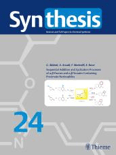
SYNTHESIS-STUTTGART
Elevating the Standards of Organic Chemistry Research.SYNTHESIS-STUTTGART
Published by the esteemed Georg Thieme Verlag KG, SYNTHESIS-STUTTGART stands as a vital resource in the field of Chemistry, specifically focusing on Organic Chemistry and Catalysis. With an impressive publication history dating back to 1970 and continuing through 2024, it serves as a platform for innovative research and developments in synthetic methodologies and their applications. The journal holds a significant impact factor, reflecting its influence within the academic community, and is recognized in the Scopus rankings as a reputable source in its categories, with a rank of #99/211 in Organic Chemistry and #43/68 in Catalysis. Researchers, professionals, and students alike can benefit greatly from its content, which upholds rigorous peer-review standards and contributes to the global discourse in these critical scientific domains.
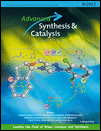
ADVANCED SYNTHESIS & CATALYSIS
Empowering researchers to transform chemical processes.ADVANCED SYNTHESIS & CATALYSIS is a prestigious academic journal published by Wiley-VCH Verlag GmbH, based in Germany. This journal, with ISSN 1615-4150 and E-ISSN 1615-4169, plays a pivotal role in the fields of Chemistry and Chemical Engineering, earning commendable rankings such as Q2 in Catalysis and Q1 in Organic Chemistry in 2023. Its high impact factor and recognition—ranking #18 in both Organic Chemistry and Catalysis—further underscore its significance as a platform for groundbreaking research and innovative methodologies. Spanning from 1996 through 2024, ADVANCED SYNTHESIS & CATALYSIS aims to disseminate high-quality, cutting-edge studies related to synthetic processes and catalytic technologies, ensuring accessibility via their open access options. By fostering a vibrant scholarly community, this journal serves as an essential resource for researchers, professionals, and students dedicated to driving advancements in synthetic and catalytic chemistry.
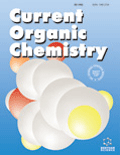
CURRENT ORGANIC CHEMISTRY
Unveiling the Future of Organic Chemistry DiscoveriesCURRENT ORGANIC CHEMISTRY, published by Bentham Science Publishers, stands as a pivotal platform in the field of organic chemistry, providing innovative insights and advancements since its inception in 1997. With an ISSN of 1385-2728 and an E-ISSN of 1875-5348, this esteemed journal has carved a niche in the academic landscape, currently ranking in the Q3 category for Organic Chemistry according to the 2023 metrics. Operating from the United Arab Emirates, it engages a diverse audience of researchers, professionals, and students by delivering quality peer-reviewed articles that cover a broad spectrum of organic chemistry research. Although the journal does not offer open access, it remains a respected source of knowledge, indexed in Scopus with a percentile ranking of 43, encouraging rigorous discourse and the dissemination of cutting-edge findings. With continuous publication through 2024, CURRENT ORGANIC CHEMISTRY is dedicated to advancing the frontiers of organic chemistry research and technology.
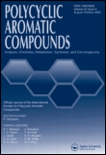
POLYCYCLIC AROMATIC COMPOUNDS
Unraveling the Intricacies of Aromatic StructuresPOLYCYCLIC AROMATIC COMPOUNDS, published by TAYLOR & FRANCIS LTD, is a pivotal journal dedicated to the study of polycyclic aromatic compounds, which play a significant role in fields spanning materials chemistry, organic chemistry, and polymers. With an ISSN of 1040-6638 and an E-ISSN of 1563-5333, this journal features a robust collection of research that informs and guides advancements in understanding the complex interactions and applications of these compounds. Having established its presence since 1990, POLYCYCLIC AROMATIC COMPOUNDS currently holds a Q3 ranking in multiple categories, including Materials Chemistry, Polymers and Plastics, and Organic Chemistry, showcasing its consistent contributions to scientific dialogues. Though traditionally not an open access journal, it provides immense value to researchers, professionals, and students seeking reliable and impactful studies. The journal is located in the United Kingdom at 2-4 PARK SQUARE, MILTON PARK, ABINGDON OR14 4RN, OXON, ENGLAND, and continues to be a trusted source for cutting-edge research in the field.
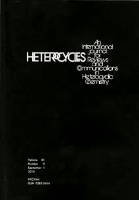
HETEROCYCLES
Catalyzing Progress in Pharmacology and ChemistryHETEROCYCLES, published by the Japan Institute of Heterocyclic Chemistry, stands as a pivotal journal within the fields of Analytical Chemistry, Organic Chemistry, and Pharmacology. With its ISSN 0385-5414 and E-ISSN 1881-0942, HETEROCYCLES has been a respected platform for scholarly work since its establishment in 1983, featuring innovative research up until 2022. While currently not open access, the journal is renowned for its rigorous peer-review process, ensuring the dissemination of high-quality research. Despite its Q4 ranking in the 2023 quartiles for its categories, it plays a crucial role in bridging gaps in knowledge and advancing the discourse on heterocyclic compounds, which are vital in drug discovery and development. Researchers, professionals, and students who are engaged in chemistry and pharmacology will find HETEROCYCLES an essential source of cutting-edge studies, insights, and an opportunity to contribute to the evolving landscape of these scientific fields.
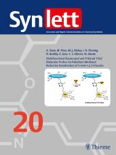
SYNLETT
Empowering Researchers with Cutting-Edge InsightsSYNLETT is a prominent academic journal dedicated to the field of Organic Chemistry, published by GEORG THIEME VERLAG KG. Since its inception in 1989, the journal has played a critical role in advancing the understanding of synthetic methodologies and organic compounds, offering a platform for innovative research and discoveries. With an ISSN of 0936-5214 and an E-ISSN of 1437-2096, SYNLETT is well-regarded in the academic community, presently positioned in the Q3 quartile for Organic Chemistry according to the 2023 category rankings. The journal is particularly valuable for researchers and professionals seeking insights into contemporary organic synthesis methods and their applications. Although it does not operate under an Open Access model, it remains a crucial resource within the field, contributing to significant advancements and collaborations globally. For those engaged in organic synthesis, SYNLETT not only encapsulates cutting-edge research but also inspires innovation in the discipline.

INDIAN JOURNAL OF HETEROCYCLIC CHEMISTRY
Bridging Theory and Application in Organic ChemistryINDIAN JOURNAL OF HETEROCYCLIC CHEMISTRY, published by CONNECT JOURNALS, is a vital resource in the fields of organic chemistry and biochemistry, aiming to advance research and promote innovation within the realm of heterocyclic compounds. Established in 1996, this journal has successfully converged into an influential publication with a commitment to disseminating high-quality, peer-reviewed research articles that enhance the understanding of heterocyclic chemistry applications. Although it currently holds a Q4 quartile ranking in both biochemistry and organic chemistry according to the 2023 categorizations, its broader contributions to the scientific community should not be underestimated, as it seeks to support the ongoing dialogue among researchers, professionals, and students. The journal operates from Ghaziabad, India, providing open access to its publications, thereby fostering a collaborative and informative environment for its international readership. With an ISSN of 0971-1627 and a special focus on contemporary challenges and developments in the field, the INDIAN JOURNAL OF HETEROCYCLIC CHEMISTRY is poised to make a significant impact as it continues to evolve through 2024 and beyond.

ARKIVOC
Innovating Knowledge in Organic Chemistry Since 2000ARKIVOC is an esteemed open-access journal dedicated to the field of Organic Chemistry, published by ARKAT USA INC. Since its inception in 2000, ARKIVOC has aimed to disseminate high-quality research and advancements in organic chemistry, fostering an international exchange of knowledge within this ever-evolving discipline. With its ISSN 1551-7004 and E-ISSN 1551-7012, the journal is committed to providing accessible content free of charge to researchers, students, and professionals around the globe. Although currently categorized in the fourth quartile of Organic Chemistry with a Scopus rank of #188 out of 211, ARKIVOC continues to encourage the publication of innovative works and critical reviews that highlight emerging trends and methodologies in organic synthesis, reaction mechanisms, and material sciences. Its open-access model since 2000 ensures that valuable contributions to scientific knowledge are widely available, promoting collaboration and discovery. The journal is based in the United States, with its editorial office located at the University of Florida, under the guidance of prominent chemists. ARKIVOC provides an essential platform for those deeply engaged in organic chemistry research, supporting the advancement of science for future generations.
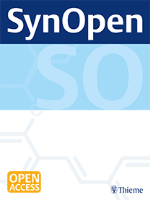
SynOpen
Bridging Biomaterials and Organic ChemistrySynOpen is an esteemed open-access journal published by GEORG THIEME VERLAG KG, based in Germany, dedicated to advancing the fields of Biomaterials, Catalysis, Materials Science, and Organic Chemistry. Since its inception in 2017, the journal has established itself as a vital platform for researchers wishing to disseminate their findings in a rapidly evolving scientific landscape, earning a commendable Q2 ranking in Materials Science (miscellaneous) and Q3 in other key categories for 2023. With an increasing impact on its disciplines, SynOpen aims to foster interdisciplinary collaboration and innovation by providing unrestricted access to high-quality research, thus promoting a broader reach and visibility for authors. Scholars, professionals, and students alike can benefit from the comprehensive range of topics covered, as the journal's commitment to presenting cutting-edge studies and methodologies positions it as a crucial resource for contemporary scientific inquiry.

HETEROCYCLIC COMMUNICATIONS
Advancing the Frontiers of Heterocyclic ChemistryHeterocyclic Communications, published by De Gruyter Poland Sp. z o.o., is a leading open-access journal dedicated to the field of organic chemistry. With its ISSN 0793-0283 and E-ISSN 2191-0197, this journal has been disseminating significant research findings since its inception in 1994, and continues to contribute to the scientific community through 2024. Based in Germany, Heterocyclic Communications occupies a reputable position, classified in the third quartile (Q3) of organic chemistry journals with a Scopus rank of #119 out of 211, indicating its growing influence in the field. The journal is committed to fostering scholarly communication and knowledge exchange among researchers, professionals, and students, providing a platform for innovative studies and insights into heterocyclic compounds and their applications. As an open-access journal since 2019, it ensures that valuable research is readily available to a global audience, enhancing collaboration and advancement in organic chemistry research.